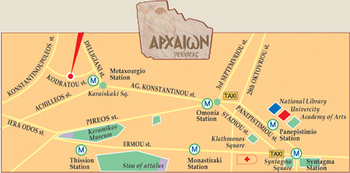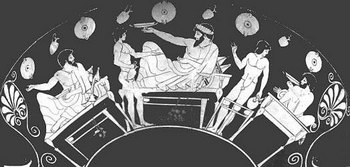When in Athens eat as the Ancient Athenians did.
One place that caught my eye during the web research I did for this trip was the Archaion Restaurant http://www.thematic-dining.gr/arxaion/default_uk.asp?page=&lanq=uk

It is near Mexagourgi Station, so we hit the metro again. We waited all of two minutes for a train, changed at Omonia (Ammonia, for reasons to be explained later) Station and we were there. We navigated with the map and found it at mid-day, and we found it closed, one disadvantage of travelling at the end of the season is that some places are closed.
Kate asked me, do you want to come back in evening and eat here? No, I replied. My interest was only curiosity. Now had it been open for lunch we would certainly have gone in. But I did not think this curiosity warranted a night ride to eat with a spoon. In any event we could not tell from the Greek signs if it was going to be open in the evening anyway.
My curiosity was partly based on my current project on meals in common – syssitia. This project is explained on another post. A meal in common is shown below from an excellent Spanish web site on Sparta from Argentina found under History at
http://www.laeditorialvirtual.com.ar/Index.asp

I thought to get first hand experience of something of the cuisine of a syssitia. However, it would be only partly accurate, because the common meals were in Sparta not Athens, and Sparta was a more fertile land than Attica, which is why Athens turned to the sea. Spartans had it better. Even so a meal without wheat, without tomatoes, without a fork … the list goes on, had no intrinsic appeal.
Athenians went in for symposia that were altogether different, always private and often luxurious with much wine.

Hence Plato’s dialogue of that name. The text is available here http://classics.mit.edu/Plato/symposium.html

The syssitia has some references to military traditions and community formation. Any idea of the origins?
Sparta.
I think that both Athens and Sparta are completely different therefore they both have conflicting strong points .ATHENS: Athens was a beautiful and busy city,there were many mountains with fertile valleys, and lots of farms.’Democracy’ or rule by the people’ was invented in the early 500 s bc. However not everyone had a vote,only a male citizen had a say in how the city was run.WHERE AS SPARTA: Fighting battles was what the Spartans did best.While Athens was trying democracy as a form of government, its rival Sparta had two kings.Although every Spartan man had a farm, he spent a lot of his time preparing for war.Fot then he became a soldier when he was 20 ..DID YOU KNOW??? Sickly babies were killed. Children ran around naked. Boys practised fighting and did athletics. Girls also did physical exercises.Also, Spartan women had more freedom than women in Athens .IT IS NOW UP TO YOU TO DECIDE WHETHER ATHENS OR SPARTA WAS BEST TO LIVE IN AT THE TIME OF ANCIENT GREECE